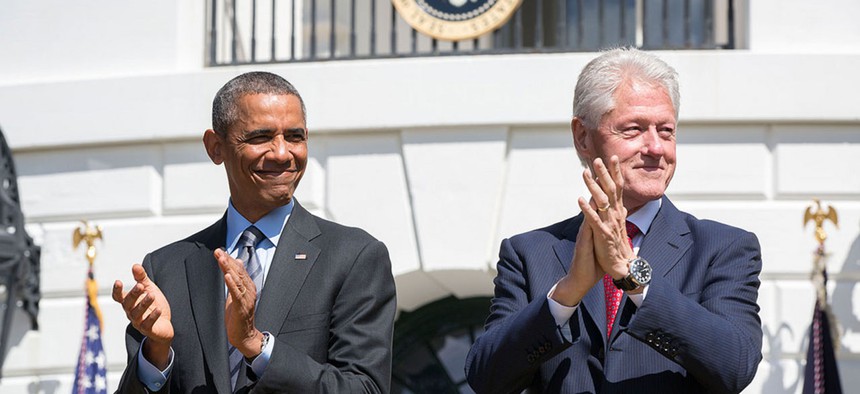
Remember us? White House file photo
Battle of the Surrogates
Hillary Clinton can call on just about any elected official in the Democratic Party, including a past and current president. Donald Trump, not so much.
On Tuesday, the Clinton and Trump campaigns did what they will do pretty much every day between now and November: try to define their opponent in the media.
Hillary Clinton’s message for the day was: Donald Trump screws the little guy. At a campaign rally, Clinton herself attacked Trump for having said he hoped the housing bubble would pop, because “people like me would go in and buy.” And as CNN reported, Team Clinton dispatched its “surrogates” to attack “Trump on the issue in six battleground states through a series of press calls, statements, and events.” The most prominent surrogate was Senator Elizabeth Warren, who reiterated Clinton’s point in harsher terms. After noting that Trump had rooted for a housing crash, she said: “What kind of a man does that? I’ll tell you exactly what kind—a man who cares about no one but himself. A small, insecure money-grubber who doesn’t care who gets hurt, so long as he makes some money off it.” Warren’s attack earned it’s own, favorable, story in Politico.
For his part, Trump’s message for the day was: Clinton enabled her husband’s abuse of women. As Politico reported, “Trump’s surrogates flooded the airwaves as they sought to further undermine Hillary Clinton, questioning how she can be a champion of women when she enabled her husband’s alleged misdeeds.”
But, Politico added, “It didn’t all go smoothly.”
It didn’t all go smoothly because, when Trump executive Michael Cohen cited Bill Clinton’s extramarital misdeeds, CNN anchor Chris Cuomo quoted Trump defending the former president and trashing his accusers in the 1990s. Cohen responded that, back then, Trump was “a private citizen … trying to protect a friend.” At which point, Cuomo pounced: “Michael, if you decide to run for office, and people say, ‘Hey, you knew Cuomo, you used to say he’s a good guy’—now I’m running against him, ‘Cuomo is a bum’—that makes it okay?”
It didn’t go much better when Iowa radio talk-show host Sam Clovis took Trump’s message to MSNBC. Pressed by host Steve Kornacki about why Clinton was responsible for her husband’s misdeeds, Clovis finally jettisoned his talking points and admitted, “What I’m hoping is that we’ll have an opportunity to put a cork in this and get back to the policy issues.” In its story on the exchange, The Huffington Post noted that Clovis had previously slammed Trump for having “no foundation in Christ” and for belittling John McCain’s war record despite the fact that Trump had “never served this nation a day—not a day—in any fashion or way.”
Trump’s supporters will likely interpret all of this as evidence of the media’s pro-Clinton bias. But there’s another explanation: Clinton has better surrogates. To help disseminate her message, her campaign can call on virtually every elected official in the Democratic Party. On Tuesday, for example, it chose politicians from swing states hit particularly hard by the housing collapse: A representative from Nevada, a representative from Ohio, and a mayor from Florida. At key moments, Clinton can also call on surrogates so high-profile that they garner almost as much media attention as she does. On Tuesday, she used Warren. As the campaign goes on, she’ll likely use her husband and Barack Obama.
Trump, by contrast, is relying mostly on little-known conservative media figures and employees from his business. While most Republican politicians are endorsing him, few will parrot his talking points on TV, especially since those talking points so often involve Bill Clinton’s sexual behavior and thus invite reporters to ask surrogates about Trump’s own. And while Hillary Clinton can call on Obama and her husband when she wants extra publicity, most of the big-name Republicans who could do the same for Trump—George W. Bush, Mitt Romney, John McCain, Ted Cruz, Marco Rubio, Paul Ryan—are hostile to him. Yes, Trump can call on Mike Huckabee, Sarah Palin, and Ben Carson. But since Palin delivered a speech in April in Wisconsin that Joe Scarborough compared to an acid trip, the Trump campaign hasn’t called on her. For his part, Carson was dubbed “worst surrogate ever” by both Politico and CBS after conceding in various interviews that Trump has “major defects,” that he lies, and that John Kasich would have been a better nominee. Another Trump surrogate, Roger Stone, has been banned from both CNN and MSNBC for wildly sexist, racist, and homophobic comments.
The surrogate gap is unlikely to prove decisive. But it matters. Clinton is not a great public communicator. Unlike Trump, she’s not adept at leveling brutal, derisive attacks. And even if she were, doing so would risk undermining her attempts to create a stature gap between herself and Trump. She doesn’t want to become Rubio. That’s why having Warren, and especially her husband and Obama, is so valuable. In his 2011 White House Correspondents’ Dinner speech, Obama displayed his talent for mocking Trump. For his part, Bill Clinton in 2012 proved more effective at rebutting Mitt Romney’s critique of Obama’s economic record than Obama himself. That convention speech, an Obama adviser told John Heilemann in October 2012, was “the most important moment of the campaign so far.”
Over the last couple of weeks, it has become clear that this may prove a closer race than many observers—myself included—imagined. Given her flaws, it may take a village for Clinton to beat Trump. Luckily for Clinton, her village is stronger than his.
NEXT STORY: Play of the Day: Clinton's Email… Again







